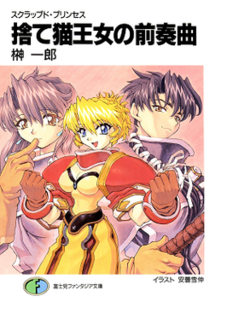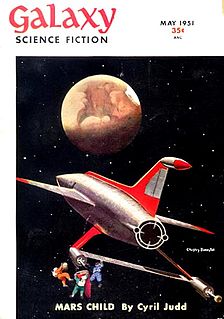
Earth: Final Conflict is an American-Canadian science fiction television series based on ideas developed by Gene Roddenberry. The series was produced under the guidance of his widow, Majel Barrett-Roddenberry, who possessed notes kept by Roddenberry that would provide the conceptual basis for the series. It ran for five seasons between October 6, 1997 and May 20, 2002.

The Three Laws of Robotics are a set of rules devised by science fiction author Isaac Asimov. The rules were introduced in his 1942 short story "Runaround", although they had been foreshadowed in some earlier stories. The Three Laws, quoted from the "Handbook of Robotics, 56th Edition, 2058 A.D.", are:

Apocalyptic and post-apocalyptic fiction is a subgenre of science fiction, science fantasy, dystopia or horror in which the Earth's technological civilization is collapsing or has collapsed. The apocalypse event may be climatic, such as runaway climate change; astronomical, such as an impact event; destructive, such as nuclear holocaust or resource depletion; medical, such as a pandemic, whether natural or human-caused; end time, such as the Last Judgment, Second Coming or Ragnarök; or more imaginative, such as a zombie apocalypse, cybernetic revolt, technological singularity, dysgenics or alien invasion.

Glen David Brin is an American scientist and author of science fiction. He has won the Hugo, Locus, Campbell and Nebula Awards. His novel The Postman was adapted into a 1997 feature film starring Kevin Costner.

The alien invasion or space invasion is a common feature in science fiction stories and film, in which extraterrestrials invade the Earth either to exterminate and supplant human life, enslave it under an intense state, harvest people for food, steal the planet's resources, or destroy the planet altogether.

Sexual themes are frequently used in science fiction or related genres. Such elements may include depictions of realistic sexual interactions in a science fictional setting, a protagonist with an alternative sexuality, a sexual encounter between a human and a fictional extraterrestrial, or exploration of the varieties of sexual experience that deviate from the conventional.

An overwhelming majority of fiction is set on or features the Earth. However, authors of speculative fiction novels and writers and directors of science fiction film deal with Earth quite differently from authors of conventional fiction. Unbound from the same ties that bind authors of traditional fiction to the Earth, they can either completely ignore the Earth or use it as but one of many settings in a more complicated universe, exploring a number of common themes through examining outsiders' perceptions of and interactions with Earth.
The idea of self-replicating spacecraft has been applied – in theory – to several distinct "tasks". The particular variant of this idea applied to the idea of space exploration is known as a von Neumann probe, after being conceived by mathematician John von Neumann. Other variants include the Berserker and an automated terraforming seeder ship.

Scrapped Princess is a Japanese light novel series by Ichiro Sakaki and illustrated by Yukinobu Azumi, also known as the popular adult dōjin artist Nakayohi Mogudan. In 2003, it was adapted into an anime series produced by Bones. The character designs in the anime are by Takahiro Komori, who is also known for the designs on another anime series, Cowboy Bebop.
The Uplift Universe is a fictional universe created by American science fiction writer David Brin. A central feature in this universe is the process of biological uplift.
An elder race in science fiction, fantasy, or horror fiction is a fictional alien race that preceded humanity. Occasionally they are a more advanced version of humanity instead of aliens. Elder races generally have abilities and technologies that generally far surpass that of humanity. In works of science fiction, their technologies are often so advanced as to seem magical or even godlike both to the human protagonists and to the present-day reader.
Doomlord was a comic strip published in the British comic book Eagle during the 1980s, from issue 1 on 27 March 1982 until issue 395 on 14 October 1989. Reprints of previous Doomlord stories continued until 7 April 1990. It was written by Alan Grant and John Wagner.

The 27th Day is a 1957 American black-and-white science fiction film, distributed by Columbia Pictures. It was produced by Helen Ainsworth, directed by William Asher, and stars Gene Barry, Valerie French, George Voskovec, and Arnold Moss. The screenplay by John Mantley is based on his 1956 original science fiction novel of the same name.
My Teacher Is an Alien is a four-book science fiction children's book series authored by Bruce Coville. The titles include:

"Hostess" is a science fiction short story by American writer Isaac Asimov. It was first published in the May 1951 issue of Galaxy Science Fiction and reprinted in the 1969 collection Nightfall and Other Stories and Robot Dreams.

The Excalibur Alternative is a science fiction novel by American writer David Weber, published by Baen Books in 2002. It is one of several novels based on the premise of David Drake's 1986 novel Ranks of Bronze. This novel is based on the short story "Sir George and the Dragon", which appeared in the 2001 anthology Foreign Legions.
Artificial intelligence is a recurrent theme in science fiction, whether utopian, emphasising the potential benefits, or dystopian, emphasising the dangers.
Ancient astronauts have been addressed frequently in science fiction and horror fiction. Occurrences in the genres include:

The Apocalypse Troll is a novel by American writer David Weber. It is a story about time travel and alien invasion.












